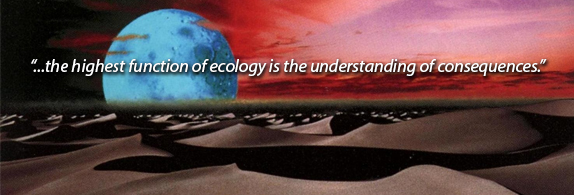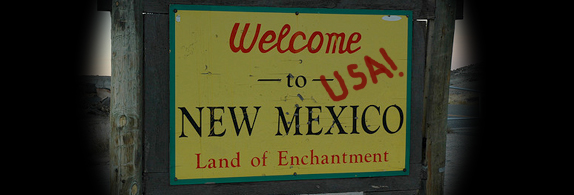Dune

With our abnormally warm early spring weather and all its gentle green glories and worries about an arid summer, I started reading, again, Frank Herbert’s world famous ecological novel Dune. It was a founding creative pronouncement of the environmental movement in America and Europe. Dune energized a generation 50 years ago, and it’s as relevant today as it ever was. Dune is probably the first novel in which the natural world is a major character. It was written by a self-taught naturalist, journalist, mythographer and science fiction master. Rejected more than 20 times, Dune was first published by Chilton Books in l965 and became the best-selling science fiction novel of its era.
Dune is the popular name of the Sahara-like desert planet Arrakis, with its terrifying, mile-long sand worms, its vast waterless expanses, its “spice” drug that brings both prescience and addiction, and its Fremen, who live on the margins of a feudal interplanetary empire, working ecologically to grow Arrakis into a planetary oasis. It’s not hard to see Dune as a metaphor for the increasingly ominous possibility of megadroughts and an intractably arid future in the American west, with all its forced growth and unsustainable populations.
With the Colorado River watershed in its 15th year of drought, California’s Sierra Nevada having another virtually no-snow year, the Rio Grande watershed without much snowpack, and only the Pecos River snowpack looking hopeful in New Mexico, Dune becomes a symbol for what might happen to a major region of the country if desert-making climate change has its way with the Southwest. All you have to do is look at the Rio Grande in southern New Mexico in the summer and the image of Dune will be self-evident.
The great lesson of Dune is about the interconnected nature of human and natural environments and how nothing is disconnected. It’s how the weakest or most vulnerable part of a matrix like water can bring down and destroy the whole thing.
As Frank Herbert has a character say in Appendix I of Dune, “The thing the ecologically illiterate don’t realize about an ecosystem…is that it’s a system! A system maintains a certain fluid stability that can be destroyed by a misstep in just one niche. A system has order, a flowing from point to point. If something dams that flow, order collapses. The untrained might miss the collapse until it was too late. That’s why the highest function of ecology is the understanding of consequences.”
The most vulnerable part of the ecosystem of the Southwest and the world is climate and how it has been radically altered by the carbon wastes of human industry. The ecosystem of the Southwest is bearing the consequences of that radical change in its own particular way.
The basic nature of water distribution and usage in the Southwest, or anywhere on the planet, is a system too. What happens in one area can have devastating consequences in other regions. And a region-wide drought can trigger off political and financial power plays of monumental proportions, ones in which financial and political might makes right. Poor states like New Mexico, that are also mismanaged like we are, are ripe for seemingly legal “takings” of water by other states and even by the federal government as happened a dozen years ago when the Department of the Interior literally diverted hundreds of thousands of acre feet of water from Southern California to the population centers in Arizona. Even a financial and political giant like California wasn’t safe.
Water vulnerability is not a vague worry of doomsayers. The city of Sao Paulo, Brazil, 20 million people strong, is in the midst of such a ferocious drought that, if it continues, city water authorities predict that residents might get water only two days a week. Despite all their dams, canals, and water works, deforestation in the watershed of the Amazon and climate change drought is close to wrecking their water system.
The interconnected and systematic nature of water management dictates that drought in California, Arizona, and Nevada could cut off or reduce much needed water from the Colorado River to politically weak and environmentally unprepared New Mexico. If drought persists in Texas, Rio Grande and Pecos river water in New Mexico will become an increasingly prioritized target of politicians and developers in the rich and aggressive Lone Star state.
An ecosystem “is a system!” Frank Herbert wrote. “A system maintains a certain fluid stability….” Population growth and historic drought are beginning to cause financial and political instability in our region. I’m not saying that the Southwest is on the verge of becoming Dune, but that’s only because Dune is a fictional place and the desertification of the Southwest is all too dangerously real.
Corporate Mind Tricks and Political Propaganda

There’s a kind of sadness mixed with anger that descends on people who realize how much they have been manipulated and bamboozled into buying stuff they don’t want or need and voting for people they don’t know enough about to trust their hat and coat to. Probably all successful companies and political campaigns know the major tricks to get us to do what they want us to do, to get us to comply.
We are a nation of suckers. Ours is a consumer economy, a sucker economy. And we are a nation of political consumers too. Mere smiles and money, mere presence and party, mere redundancy and the glitz of accusation or falsehood repeated until it appears to be the truth, all squeeze out our leaders onto the public stage like icing squeezed from a tube. As the 2016 presidential year approaches we realize we know as much about potential candidates as we know about over-the- counter drugs sold to us through brand recognition alone, despite the tiny fine print warnings about side effects and other dangers.
How has this pathetic situation come to pass? I think it has something to do with marketers who understand frailties and reflexes of the human psyche, a field studied by charlatans and dictators, mega billion dollar corporations, pick-pockets and superspies from time immemorial.
It’s a fairly small bag of tricks according to psychologist Robert B. Cialdini in his book, Influence: The Power of Persuasion. The tricks aren’t iron laws, but they work much of the time, and work so well, they make people rich and powerful. And the tricksters, themselves, don’t think they are opinion thieves, or behavior modifiers subtly forcing people to comply with their will. They see themselves as smart campaigners or good salesmen.
I’ll just describe a few of Cialdini’s insights, which he calls “weapons of influence” used by almost all “compliance professionals.” One is called the “contrast principle,” which can be “virtually undetectable.” The principle is that first events, first sales, first promises tend to set a “patsy” up to comply with the following pitch or hit. Sell a person an expensive suit of clothing and chances are very, very good that they will readily purchase lesser priced articles of apparel (ties, shirts, socks, cufflinks) that might add up to being more expensive than the suit itself. The contrast of the big price first and the lower prices next make us apparently lose our capacity to pay attention to the obvious. Convince someone of a proposition or a fact, get them to commit to it, and chances are they’ll comply with the next proposition which is really a pitch. Why would that be? Because our society places a heavy emphasis on the honorability of being consistent. If we don’t comply with the following proposition, the first one we committed to would be put into question and our desire for consistency can’t let that happen—most of the time.
Another principle is one of “reciprocation,” or logrolling, as they call it in Congress. Taking care of your constituents’ needs and solving their problems isn’t just a matter of altruism. It sets up a “trigger” that automatically engages an apparently deep human impulse to reciprocate, or comply with a request after being gifted with a favor, even if you don’t ask for the favor. Help a constituent and they will, more likely than not, feel obliged to vote for you even if what you did for them wasn’t all that successful or important. The principle of reciprocation is behind all the solicitations in the mail that come with stamps, address labels, a penny taped to a flier, calendars, or greeting cards. Most of us, most of the time, feel obliged to reciprocate with a donation.
Cialdini cites many other tricks. The most objectionable one to me is our submission to the opinion of authorities. We tend to follow leaders and experts, even if we don’t know where they are going or how much more they know than we do. All that really needs to happen is for someone to be labeled an expert. This includes all those “doctors” who used to smoke in tobacco advertisements, or politicians who refuse to think about climate change because, they say, “I’m no expert.” We’re such lemmings when it comes to expert authority that a person who knows a great deal about one subject, say nuclear physics, can make a pronouncement about something they know nothing at all about, like public health or cancer, and people, especially media people, treat what they say as gospel.
It’s the same way with faking social approval of an idea with a skewed or bogus poll, or using canned laughter in a sitcom. The poll sways people’s minds, even if they know that polls are, by their nature, biased and rigged. The laugh track makes people laugh and find things funny that, without the approval of the fake audience, they might find unlaughably boring.
Most of the tricks in Cialdini’s book work because they trigger off automatic responses and protect us from the effort, the occasional embarrassment and the stress, of having to think rationally for ourselves.
WWLNM: Terra Incognita

For many years New Mexico Magazine ran a last page in each edition entitled “One of Our Fifty is Missing.” The page featured cartographic gaffs in which Arizona went all the way to Texas with no New Mexico in between, or one of the endless references to the possibility of needing a visa to get into the Land of Enchantment.
Long ago our status as a missing place might have been called “terra incognita,” an unknown land. With all the world’s wars and miseries bombarding us from every source, from Internet to newspaper to radio and TV, being out here in a missing place at the beginning of Spring can bring a glorious peace of mind—soaring pollen counts, watery eyes and sinus throbbing not withstanding.
In fact, one can get lost in Spring here, the floating clouds, the warm evenings, the eagerness to be in the garden, the false green of the elm seeds with their profusion of delicate seed pods soon to be Tingley flakes, green frogs in the ditches, and the soft luxury of the sounds of water running through the checks. Lilacs are blooming now. Tomatoes are still wary. The blossoms on the apricot trees await their usual early exit, but who knows? Maybe fruit this year.
Here in terra incognita, Springtime’s gentle lyrics banish the harshness of the world. And just as the world doesn’t really know we exist, we can turn from it and hardly worry about it at all. That’s one of the miracles that comes from being
“out of the way,” “off to one side,” “over there” or “over the next horizon.” I wouldn’t trade this Spring in New Mexico for any big city splendor, or any form of “April in Paris.” April here is more than just right. It’s all we could want.
(Photos: Magic by JD Hancock; 4 Corners NM sign by Jason Rogers / CC)

April 06, 2015